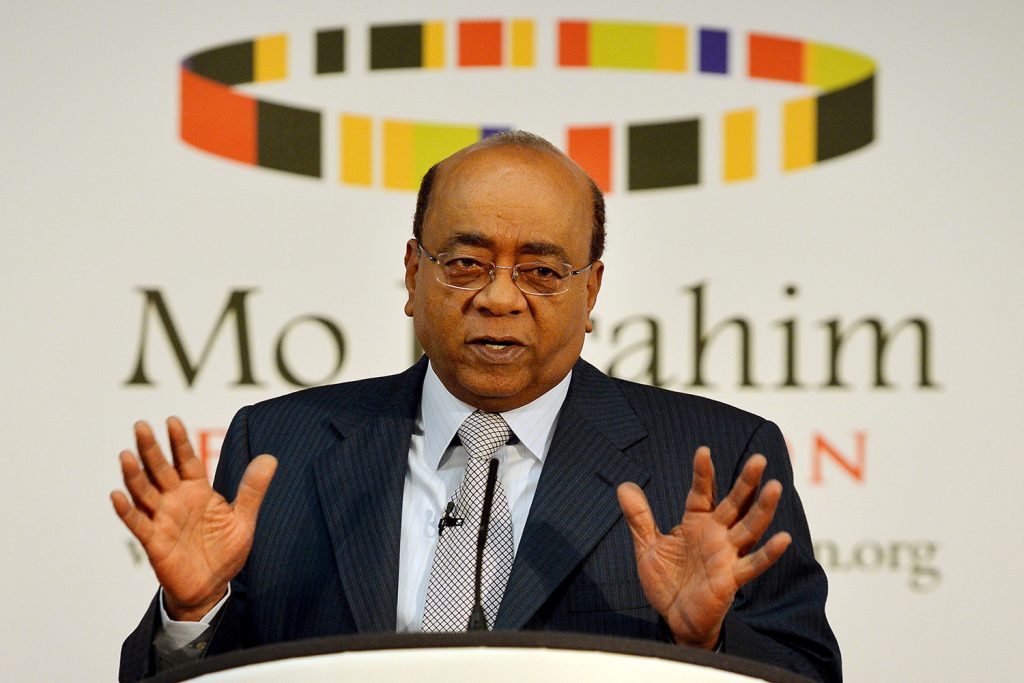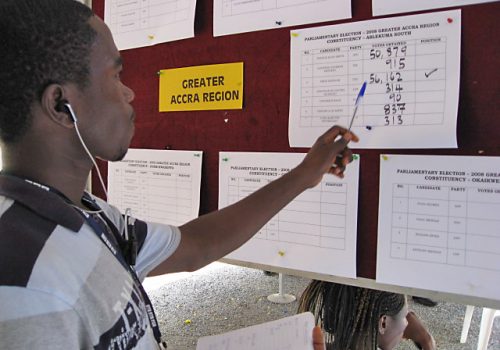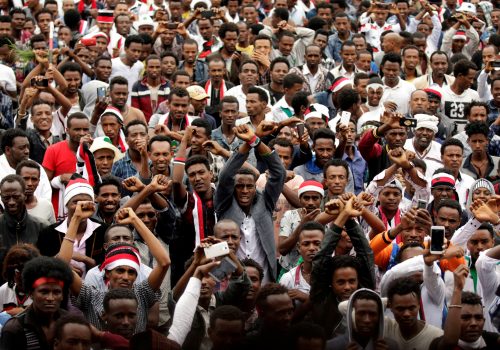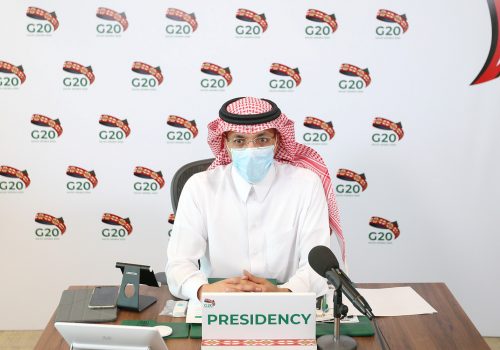The COVID-19 pandemic has stressed economies and societies around the world, and in Africa the crisis risks reversing the governance and development successes of the last few decades.
That’s the message Dr. Mo Ibrahim, a Sudanese-British entrepreneur, philanthropist, and founder of the Mo Ibrahim Foundation, conveyed during an Atlantic Council Front Page event on December 8. A well-known Afro-optimist, Ibrahim has invested in the continent’s democratic progress and has focused on tackling practical governance issues. While the pandemic has exposed such problems across the world, he noted, one of its lessons is that Africa must be “more self-sufficient” and “resilient.”
Ibrahim warned that 2020 has brought not only the COVID crisis to Africa, but also worrying signs about the state of governance on the continent. He reported that his foundation’s latest Ibrahim Index of African Governance (IIAG) report showed a decline in its measures of good governance for the first time in a decade, even alongside optimism about places such as Sudan that are undergoing democratic revivals.
Here’s a brief recap of what Ibrahim said about the decline in governance, the challenges of COVID, and why there are also reasons for hope in the region:
A COVID wake-up call
- Building strength at home: The scramble to protect economies and supply chains from the shock of coronavirus has offered Africa a tough lesson on the importance of self-sufficiency, Ibrahim argued. As global supply chains faltered, African leaders found solutions within Africa severely lacking. Ibrahim explained that when leaders attempted to “buy food from a neighbor,” they realized that “there was no road” set up to adequately transport the goods. Ibrahim hopes African leaders will use the crisis to jumpstart regional-integration talks that can bolster Africa’s continental economy and build its resiliency.
- No premature victory: As markets rejoice at the positive news of coronavirus vaccines, the first doses of which were being administered in the United Kingdom as Ibrahim spoke, the philanthropist warned that Africa will “need some access to the vaccine and also some ability to distribute the vaccine” with the help of Western resources. While Western leaders may be tempted to focus on just their own domestic situations, “this pandemic is global,” Ibrahim argued, “you cannot deal with it in silos.” If Africa is not able to benefit from vaccines, coronavirus will not be stopped, he insisted: “You can only declare victory locally when we declare victory globally.”
- More economic solidarity: Ibrahim also lamented the lack of international solidarity in response to the economic crisis. “There has been a lot of talk, but not much has been done,” he explained, pointing to African leaders’ disappointment at failed debt-relief talks and vague Western stimulus proposals. Unlike their Western counterparts, in Africa “governments don’t have the fiscal space to support businesses. They are left on their own.”
Worrying trends in governance
- Twenty years of progress: Ibrahim explained that his foundation’s governance index rests on four key areas of governance: security and safety; human rights and democratic participation; the economy; and human-development issues such as healthcare and education. Over the last twenty years, “governance in general in Africa has been improving,” he noted, as “sixty percent of African people live in a better governed country” than before.
- A dangerous tradeoff: In the last ten years, however, improvements in the economy and some human-development areas have been coupled with “deteriorating” standards in security and human rights. Many African leaders are attempting to orchestrate a tradeoff with their societies where economic growth is prioritized while freedoms are simultaneously rolled back. “It doesn’t work,” Ibrahim argued, warning that this imbalance is causing the progress in governance across the continent “to stagnate in the last five years” and to go “down in general” this year for the first time in a decade.
- Consistent attention needed: Ibrahim argued that Western countries that want to help promote stronger governance in Africa need to look beyond their current focus on elections as the only metric of success. There is an assumption in the international community, he explained, “that every four or five years…there is a moment in the country’s history where people go and practice their democratic rights. I think people should be able to practice their democratic rights every day of the week.” Ibrahim suggested that international observers keep closer tabs on how African countries set up election infrastructure, campaigning, and the ability for citizens to participate in the governance process outside of election years.
Africa’s greatest hope
- What the young bring to the table: Despite challenges to improved governance, Ibrahim was hopeful for continued democratic change in Africa, especially as the growing youth population begins to flex its political muscles. “Our future is in the hands of [these] young people,” he said, pointing to the role youth played in the peaceful ousting of former Sudanese President Omar al-Bashir. Although the continent faces considerable challenges in the COVID era, “this young generation is far better equipped than [older generations] to deal with these issues,” Ibrahim argued. “They are better educated, better informed” than many older Africans, and the youth have deeper experience with the internet and other digital skills.
- Focus on 21st-century education: In order to harness the growth and talent of this new generation, however, “the education system in Africa needs to improve with time,” he said. “We need more technical schools, we need people who can fix tractors, who can build roads, who can build dams,” he argued. For too long, the school system was primarily “built upon just producing clerks” for government jobs, he explained. “We don’t need clerks, we need dirty hands who are educated.”
Avoiding international squabbles
- Many new players: The economic growth spurred by Africa’s growing youth population has also garnered greater international interest in the continent. “The world woke up to the fact that this is a huge market and is growing fast,” Ibrahim explained, which has led to many more economic deals and political alliances between African nations and other international powers from Europe, Asia, and the Americas. Ibrahim stressed that this new scramble to make deals on the continent has come about after the United States “almost withdrew out of Africa” and “created a vacuum for people to come in.”
- Steering clear of conflict: While “it is wonderful to be open to everybody and to be friends with everybody,” Ibrahim cautioned “the problem…is when Africa becomes a theater of proxy wars.” He noted the Libyan war as an example of a domestic conflict that has worsened as a result of international involvement and expressed concern at the increased international security presence in strategic regional areas such as Djibouti. “This competition is really unhealthy for us,” he stressed. Quoting an African proverb, he added, “when the elephants fight, the grass suffers.”
David A. Wemer is associate director, editorial at the Atlantic Council. Follow him on Twitter @DavidAWemer.
Further reading:
Image: Mo Ibrahim during his address at the launch of the 2013 Ibrahim index of African Governance, and the announcement of the prize for Achievement in African Leadership, at Senate House in central London. (REUTERS)



